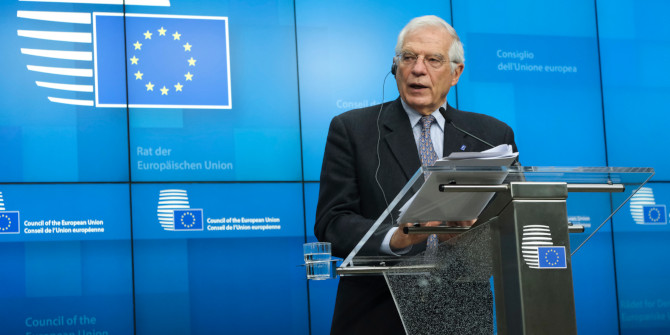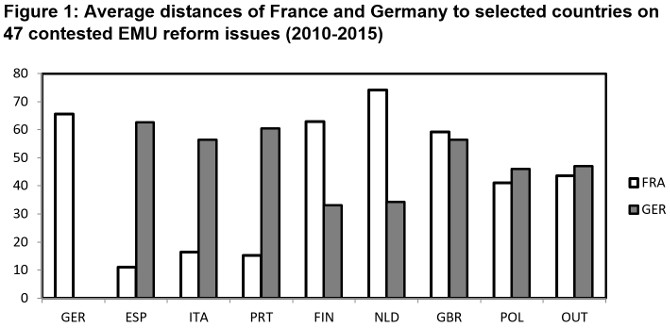Opinion polling suggests a majority of EU citizens support increased defence cooperation. But does this give a robust mandate for further integration? Drawing on a new study, Matthias Mader, Moritz Neubert, Felix Münchow, Stephanie C. Hofmann and Harald Schoen show that public opinion can change significantly when the costs associated with cooperation are made clear.
The Russian aggression against Ukraine that began two years ago had far-reaching ramifications. Among others, it engendered a renewed discussion around security and defence cooperation in Europe. There have been many appeals to increase European cooperation and small movement in that direction, but no significant steps towards deepening integration. Overall, the reaction seems to correspond to a well-known pattern, where political actors at the EU and national levels repeatedly call for further integration but do not follow through. Security and defence remains one of the least integrated policy areas in the European Union.
Political actors might hesitate to take further integration steps because they fear a public backlash. However, public opinion polls consistently show strong support for more security and defence cooperation. The latest Eurobarometer survey on this topic shows as much as 80% of respondents support increased defence cooperation and 77% support a coordinated purchase of military equipment. Accordingly, one might wonder why policymakers do not push for more cooperation. After all, defence and security integration speaks to geopolitical circumstances and enjoys the public’s backing. Thus, policymakers seem to enjoy a clear mandate for further integration.
At the same time, existing research is divided over the robustness of the public’s support. Some argue that these high levels of support reflect real public demands. Accordingly, policymakers interested in deepening cooperation should not fear Eurosceptic politicisation strategies. Others suspect that public opinion on these issues is somewhat superficial as citizens may not be fully aware of the consequences associated with these policies. There is, then, room for political entrepreneurs to create opposition by raising the negative implications. In short, whether or not public support should be seen as a clear-cut mandate for policymakers remains unclear.
Public opinion and cost considerations
We shed new light on this issue in a recent study, where we investigated whether public attitudes towards common EU security and defence policies change when the costs associated with cooperation are made salient. After all, costs play an important role in discussions around European security and defence policies. For example, governments continue to argue fiercely about the financing of arms deliveries to Ukraine, indicating that abstract support is not necessarily unconditional.
We reasoned that explicit references to costs should remain without consequences if citizens already had informed attitudes on the issue. In that case, they would have already thought about the costs and taken them into account when forming their opinion. To mention them again would be like bringing owls to Athens. However, if attitudes were superficial, the mention of costs should lead to significant changes in support, as citizens would reconsider their attitudes in light of this information.
Based on this idea, we fielded two experiments with more than 40,000 participants in 24 EU member states and the United Kingdom. We asked participants to report their support for a hypothetical military intervention and a hypothetical defence procurement project. In each experiment, a randomly selected subset of participants was additionally confronted with short, easy to understand information about the potential costs of these cooperative activities, while another subset did not receive this information.
Figure 1 shows key findings from the experiments. For each country, it contrasts the average support level of participants who did receive additional information about casualties or potential job losses (treatment group) with that of participants who did not (control group). Countries above the diagonal are cases in which the information lowered support; countries are coloured in red if a majority supports the project in the control, but not in the treatment group. The results show that mentioning these costs lowers support for both policies considerably, in particular for the defence procurement issue. Notwithstanding some small deviations, this general pattern holds across countries and personal characteristics of individuals.
Figure 1: Proportion of supporters per country, control vs treatment groups
Note: The figure shows the share of respondents indicating they somewhat or strongly support the policy for each country in the control (y-axis) and treatment group (x-axis).
Compared to the generally high figures of support in Eurobarometer surveys, our results also point towards generally lower levels of support for cooperation in matters of security and defence – even in the absence of cost considerations. We ascribe this divergence to different levels of abstraction. The favourability of specific measures of European cooperation is usually lower than the general idea of a common security and defence policy. Both activities can still count on majority or at least plurality support without further politicisation, but cost considerations may transform a majority to a minority position, especially if the majority is slim before politicisation takes place.
Academic and policy implications
The main takeaways from our study are twofold. One is that political communication based on cost considerations has the potential to influence citizens’ attitudes and shift majority positions. A Eurosceptic politicisation strategy that focuses on costs could convince the public. Two, our findings suggest that high public support (measured through polling) in the absence of contentious political debate about the issue should not be interpreted as a robust mandate for further integration.
However, our results should not be mistaken as evidence that cost-based politicisation will necessarily reduce public support. Real-world policy debates are much more complex than our experimental setup. Crucially, citizens are typically exposed simultaneously to messages about the costs and benefits of a given policy proposal, and often multiple proposals compete for public support.
Furthermore, our experiment was a one-off message, whereas in long-term political campaigns the public is repeatedly exposed to (different) messages. Hence, it is difficult to generalise from our experiments to how cost-based politicisation strategies play out when used by political entrepreneurs over time. In short, where public opinion ends up at the end of such a debate remains uncertain – until political leaders dare to test the waters and champion substantial reform projects even in the face of political resistance.
For more information, see the authors’ accompanying paper at European Union Politics
Note: This article gives the views of the authors, not the position of EUROPP – European Politics and Policy or the London School of Economics. Featured image credit: Alexandros Michailidis / Shutterstock.com






